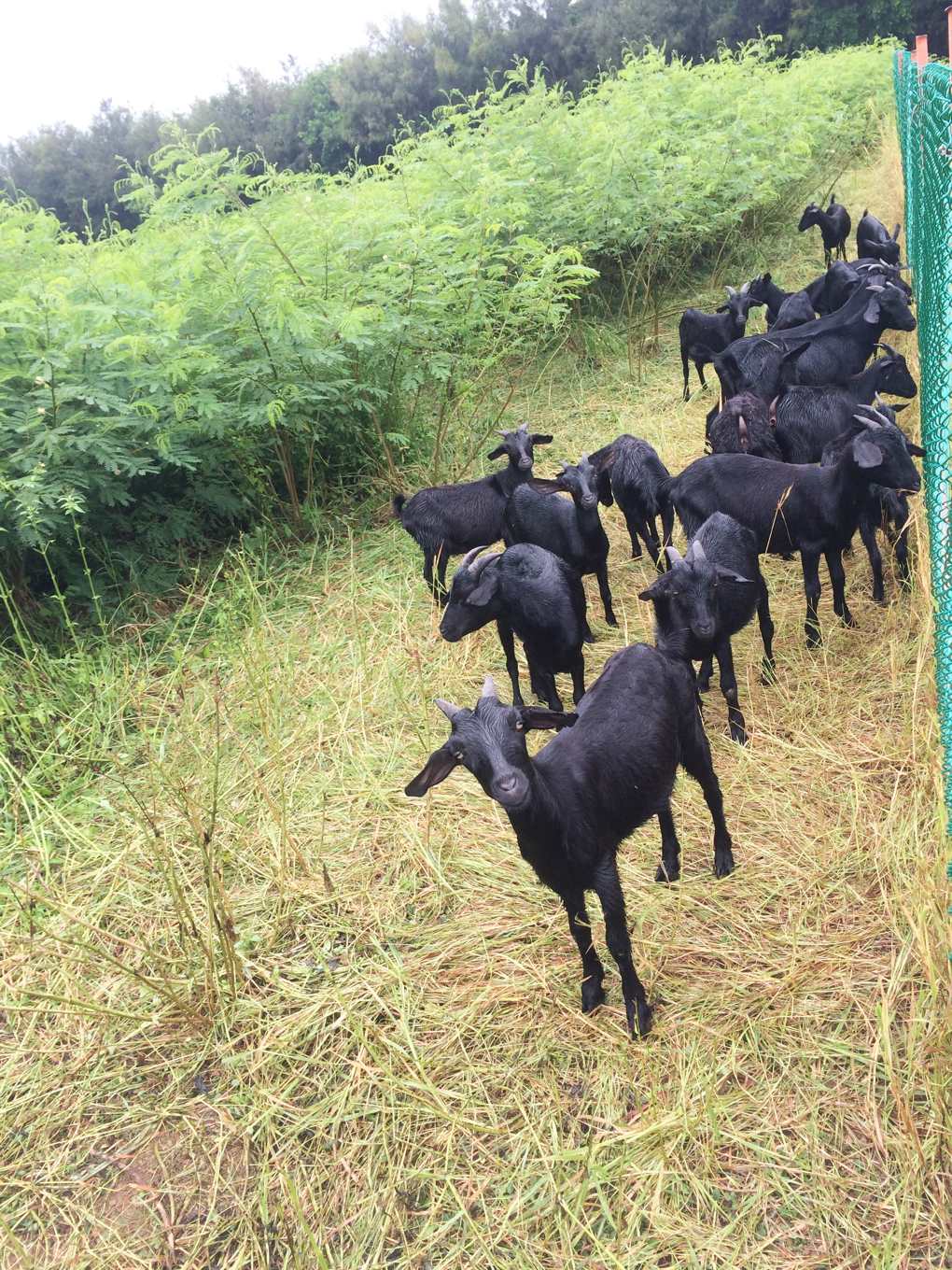The native black goat is super strong! Five sheep eat a hectare of poisonous Leucaena leucocephala a month.
Share1.9K + 1 Tweet EmailShares 1.9K
The problem of the ravage of Leucaena leucocephala, a hundred toxic alien invasive species, is expected to be solved! In the Penghu workstation experiment of the Animal testing Institute, native goats were grazed in the local Leucaena leucocephala area in an attempt to solve the problem of lack of ruminant sources for sheep farmers and the harm of Leucaena leucocephala. Five rams successfully cleared one hectare of Leucaena leucocephala occupied area within a month, and there were no poisoning phenomena such as abnormal health.
Xu Jitai, a professor in the Department of Animal Science and Technology at National Taiwan University, said that the large number of Leucaena leucocephala in Penghu and its distribution in flat land, coupled with the need for goat conservation, is suitable for the development of a goat grazing industry with Penghu characteristics, but he suggests that Leucaena leucocephala should not exceed 20% of the whole as a whole, emphasizing that it should be matched with other foods, and that sheep should not be allowed to eat Leucaena without restriction.

.jpg)
Sheep Association has doubts about Leucaena: sheep farmers need to be accurately informed by the research unit of the quantity to be fed.
Lin Chun-Chen, director of the "Republic of China Sheep raising Association," said that at present, there are about 100, 000 mutton sheep in Taiwan, but there are only less than 2000 native goats, and there are not many purebred black goats left in Taiwan after crossbreeding, so it is considered that the goat conservation task of the livestock testing center is very important. However, as to whether Leucaena leucocephala is suitable for feed, "I dare not push, for fear that there will be problems with the sheep." Lin stressed that before the sheep association dares to try, it must be endorsed by experts and scholars.
Su Ruijuan, secretary general of the Sheep Association, says that Taiwan's land is limited and sheep are not suitable for grazing. At present, only Penghu, Miaoli, and eastern China graze goats, and grazing also takes into account soil and water conservation. Generally speaking, domestic mutton sheep are mostly kept in captivity. Su has reservations about Leucaena leucocephala as feed. She believes that if it is to be further extended to the industry, the research unit should first conduct a comprehensive experiment and evaluation, "to tell us exactly how much a sheep can only eat (the amount of Leucaena leucocephala). Follow-up effects or possible problems should also be said, so that the industry can refer to." Su stressed that if there were still doubts about Leucaena leucocephala, the industry would not rashly adopt it.
Lin Qinyi, the owner of the Qinghe Ranch in Hualien, raises nearly 100 native goats. Lin Qinyi, the owner, says that her goats prefer to eat appendix grass, tree-building trees, mulberry leaves, and small flowers. She heard that early Taiwanese farmers used Leucaena leucocephala as livestock fodder, so she also provided food for her own goats, but the sheep were very picky and didn't have a high acceptance of Leucaena leucocephala.
Scholar: Leucaena leucocephala is used as feed, accounting for at most 20%.
Hsu Chi-tai, a professor in the Department of Animal Science and Technology at National Taiwan University, has studied animal feed formulations for many years. He mentioned that Taiwan was indeed used to feeding Leucaena leucocephala in the early days, but it contained toxins and could not be used as a staple food for livestock. "it can only be eaten in a certain amount. Eating too many sheep may cause poisoning." Xu said sheep farmers will not rashly use risky feed and will worry that consumers will have doubts and impact on the mutton sheep industry.
As for the special geographical environment and industrial conditions of Penghu, Xu Jitai points out that the large number and distribution of Leucaena leucocephala in the local area, coupled with the need for goat conservation, is suitable for the development of a goat grazing industry with Penghu characteristics, but he suggests that Leucaena leucocephala should not exceed 20% of the whole as a whole, emphasizing that it should be matched with other foods, and that sheep should not be allowed to eat Leucaena leucocephala without restriction.
In response to the views of the Sheep Association and scholars, Liao Xiaohan responded that at present, "raising sheep and eating Leucaena leucocephala" is really only applicable to Penghu, and if it is to be extended to other regions, there are still many challenges, for example, to solve the problem of the cost of felling and collecting Leucaena leucocephala. It is also necessary to conduct a more comprehensive assessment of the toxicity of Leucaena leucocephala.
Share1.9K + 1 Tweet EmailShares 1.9K
- Prev

Another deterioration of international image, Taiwan fishing boat "Fu Shen 11" detained South Africa, accused of poor labor environment
Another deterioration of international image, Taiwan fishing boat "Fu Shen 11" detained South Africa, accused of poor labor environment
- Next

Leo supports pet sterilization most! Don't forget to sterilize your pets before the peak of cat and dog breeding in autumn!
Leo supports pet sterilization most! Don't forget to sterilize your pets before the peak of cat and dog breeding in autumn!
Related
- A course of planting techniques and methods on how to grow carrots
- How to plant the latest tulips?
- Is it better to pick tea in the morning or in the afternoon? When is the best time for tea to be picked? what is the third or fifth tea?
- Launch Yuanxiao Happy combination Haocha + Tea Yuan healthy Taste
- Penghu Tourism "Fireworks 20 Parade with You"
- 2022 West Lake Happiness holds "Digital Revitalization Voucher" and draws iphone13 and laptop.
- Banqiao Fuzhou social houses are designed to change start-up combined with police elimination to create a safe and livable environment
- The convenient measure of "mechanical weeding" in Xinbei has been abused and the Agriculture Bureau has imposed heavy penalties on the illegal land consolidation.
- Changgeng University Joins Hands with Four Memory Factories to Rescue Memory Talent Shortage
- The list of Taiwan's top 100 MVP managers is listed by the Director-General of the Farmers' Association of Sanxia District.

